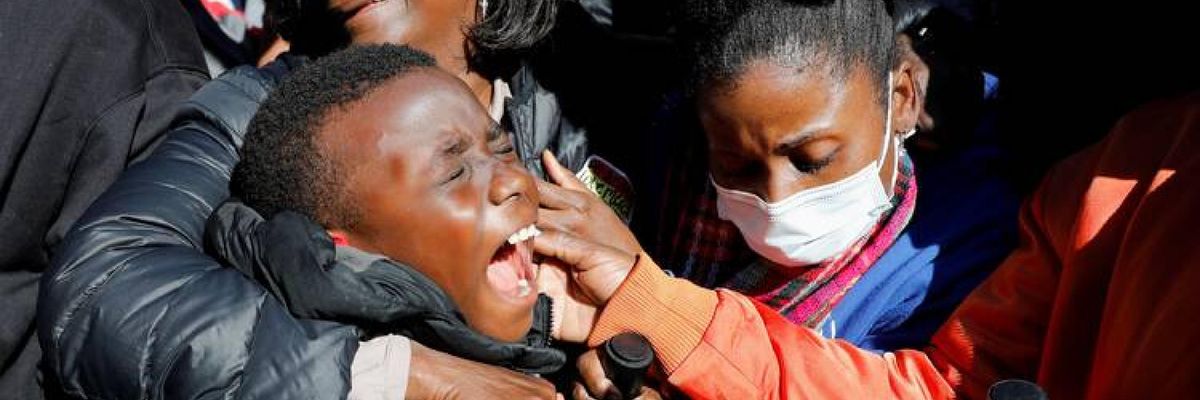Wednesday was Georgia's first Ahmaud Arbery Day, marking two years since Arbery - 25, black, unarmed, jogging in a neighborhood near where he lived - was chased and shot dead by three white good ole boys who, this week's federal trial revealed, habitually called black people "niggers." (Yes, we're saying it.) In November, Travis McMichael, his father Gregory, and Roddie Bryant, who carried out what's widely deemed a modern-day lynching in broad daylight, were convicted of multiple charges, including malice murder and felony murder, in a state trial that controversially barely referenced race. In January, they all received life sentences in state prison, which they're appealing; only Bryant was given a chance of parole. On Tuesday, they were also found guilty of federal hate crimes in a second trial that brutally laid bare the lethal, heedless, enduring racism of "an America where every day people feel completely free to speak hate." In that case, brought by the Department of Justice, prosecutors argued the men killed Arbery out of "racial assumption, racial resentment and racial anger," and a jury of eight whites, three blacks and one Hispanic agreed. Rev. Al Sharpton called the guilty verdict "precedent- setting," proving it is now finally possible that, "Even in the Deep South, the feds will convict you of hate actions."
But such prosecutions are distressingly rare. According to DOJ data, only about 600 alleged hate crimes were investigated from 2015 to 2019; of those, over 80% weren't prosecuted for lack of evidence. Given the legal challenge of proving racist intent - when Georgia still didn't have a hate crime law - the men's state trial mostly dodged the issue of race. In harsh contrast, the second one exposed the visceral racism - what feds termed "pent-up racial anger" - you'd expect of Lost Causer yahoos cruising in a truck adorned with Confederate flags. In her damning testimony, FBI analyst Amy Vaughan, reminding us the Internet is forever, cited an ugly litany of racist slurs the men happily, regularly spewed in texts and on social media - thus confirming Travis' blithe boast, "We used to walk around committing hate crimes all day." Because black people "ruin everything," Travis said he liked his new job: "Not a nigger in sight." Black teenagers were "monkeys"; when they beat up a white teen, he offered, "I say, shoot 'em all." A white woman dating a black man was "a nigger lover"; on Julian Bond's death: "All these Blacks are nothing but trouble. I wish they'd all die." "Happy Bootlip Day," Bryan wrote a friend on MLK Day. "I worked like a nigger today." On his daughter dating a black man: "She has her nigger now." A final, grisly irony: In court, they defended their "citizens' arrest" with an 1863 law meant to catch escaped slaves, which is likely why Travis called Arbery, bleeding out on the ground, "Nigger."
This week's trial went ahead largely thanks to the grit and fury of Arbery's mother Wanda Cooper-Jones, who sought to put on the historic record that three racists killed her son for being black. In that, she opposed a plea deal struck by the feds: The men would plead guilty to one federal count; then they'd avoid a hate crimes trial and do their time in a cushier federal prison. "Please listen to me," she told the judge appraising the deal. "Granting these men their preferred choice of confinement (gives) them one last chance to spit in my face." The judge took the rare step of rejecting the deal, opening the way to this week's verdict - another small pained step, advocates say, to "advance the work of justice." Earlier, the state of Georgia had declared Feb. 23 Ahmaud Arbery Day "in perpetuity," calling him a "distinguished citizen" whose life was taken "because of the color of his skin." It also noted two changes: a new state hate crimes law, and repeal of the slave-catching law. On Wednesday, amidst a commemorative march, run, vigil, release of doves, Cooper-Jones announced a foundation in her son's name to award six scholarships yearly, and called the state's changes "just the beginning - we must change the minds and the perception of Black men in this country." She was just as fierce talking to the media after the verdict, blasting a DOJ that "was made to do their job." "We got a victory today," she added, but "Ahmaud is gone forever." She was asked if the verdict helped with her "healing." "Healing?" she repeated. The word hung in the bittersweet air. "I, as a mom, will never heal," she said, a slight catch in her voice. "Now I want to go back to the DOJ..."
